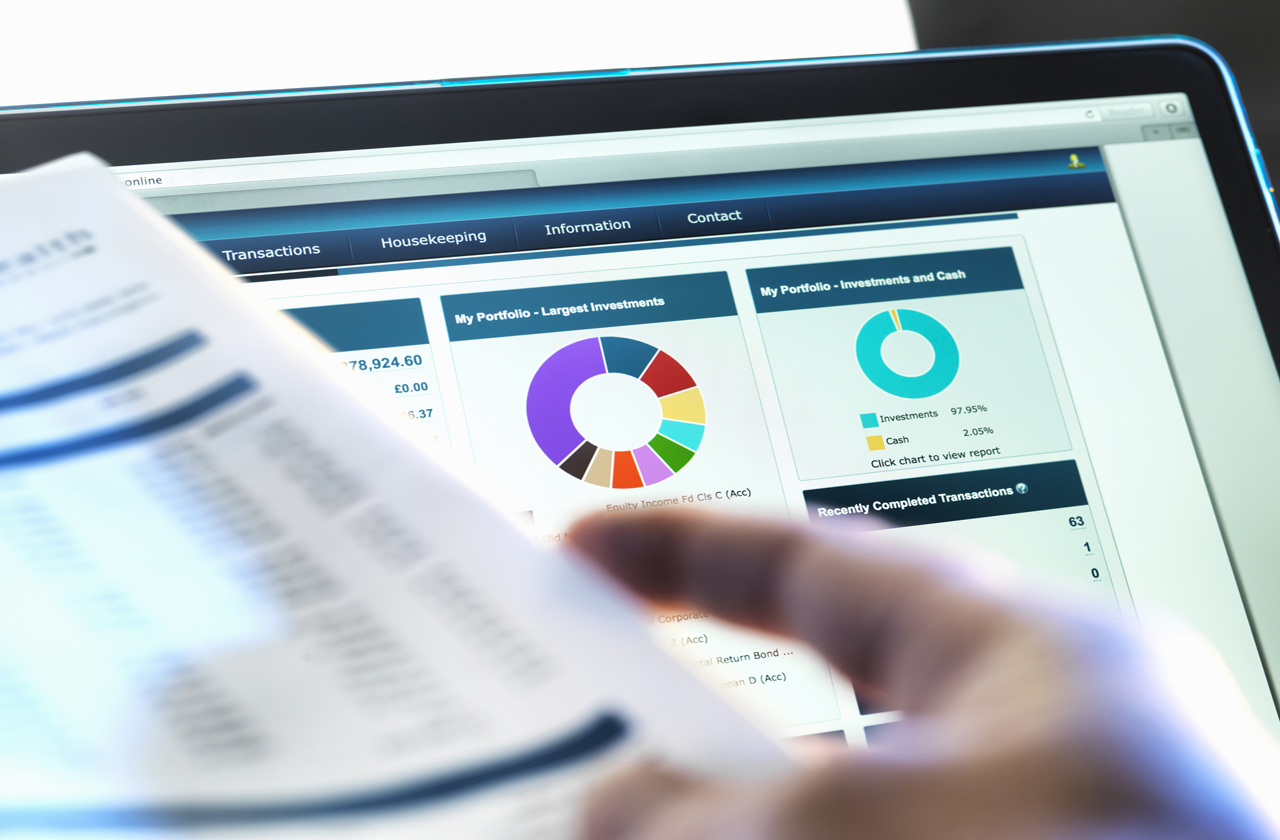Investment Moves to Consider in Times of Rising Interest Rates
The Federal Reserve has raised rates three times since December, and conservative investors have some decisions ahead. What about bonds? CDs? Dividends? Here’s what to think about.


Profit and prosper with the best of Kiplinger's advice on investing, taxes, retirement, personal finance and much more. Delivered daily. Enter your email in the box and click Sign Me Up.
You are now subscribed
Your newsletter sign-up was successful
Want to add more newsletters?

Delivered daily
Kiplinger Today
Profit and prosper with the best of Kiplinger's advice on investing, taxes, retirement, personal finance and much more delivered daily. Smart money moves start here.

Sent five days a week
Kiplinger A Step Ahead
Get practical help to make better financial decisions in your everyday life, from spending to savings on top deals.

Delivered daily
Kiplinger Closing Bell
Get today's biggest financial and investing headlines delivered to your inbox every day the U.S. stock market is open.

Sent twice a week
Kiplinger Adviser Intel
Financial pros across the country share best practices and fresh tactics to preserve and grow your wealth.

Delivered weekly
Kiplinger Tax Tips
Trim your federal and state tax bills with practical tax-planning and tax-cutting strategies.

Sent twice a week
Kiplinger Retirement Tips
Your twice-a-week guide to planning and enjoying a financially secure and richly rewarding retirement

Sent bimonthly.
Kiplinger Adviser Angle
Insights for advisers, wealth managers and other financial professionals.

Sent twice a week
Kiplinger Investing Weekly
Your twice-a-week roundup of promising stocks, funds, companies and industries you should consider, ones you should avoid, and why.

Sent weekly for six weeks
Kiplinger Invest for Retirement
Your step-by-step six-part series on how to invest for retirement, from devising a successful strategy to exactly which investments to choose.
Over the past few years — since the financial crisis of 2008 — we’ve seen interest rates compress to historic lows.
That’s been good for people with debt and those who are borrowing to buy a car or a home. But it’s problematic for careful savers and retirees looking to pull income from their investment portfolios.
A Risky Migration for Many
They paid off their mortgage, dumped their debt and put their money into safe financial vehicles, like certificates of deposit and money market accounts — only to see their nest eggs slowly crumble, thanks to inflation.
From just $107.88 $24.99 for Kiplinger Personal Finance
Become a smarter, better informed investor. Subscribe from just $107.88 $24.99, plus get up to 4 Special Issues

Sign up for Kiplinger’s Free Newsletters
Profit and prosper with the best of expert advice on investing, taxes, retirement, personal finance and more - straight to your e-mail.
Profit and prosper with the best of expert advice - straight to your e-mail.
As a result, many ended up leaving the secure savings vehicles they loved to reach for higher yields in riskier asset classes, perhaps without understanding what it could mean in the long run.
Bonds Get Bumpy
Now, as we enter what appears to be a rising-interest-rate environment (central bank policymakers have raised rates three times since December and are forecast to lift them a quarter of a percentage point once more in 2017), it could mean trouble for those who bought into funds with high-yield longer maturities.
A rise in rates can make things pretty bumpy for bond assets. We actually saw that happen rather aggressively right after the presidential election.
If that made you a bit nervous (and if it didn’t, it should have), it may be time to do a little portfolio rebalancing.
What Should Bond Investors Do?
Super-safe investors who want to stay with their bonds should look at repositioning into shorter-term (three- to five-year) bonds, which are traditionally less sensitive to rising rates than intermediate- and long-term bonds.
Floating rate notes, which typically have a two- to five-year term to maturity, also tend to behave better in a rising-interest-rate environment. FRNs have variable rates that reset periodically.
Senior Loans and Dividend Options
Another option is to pivot more into senior loans, which are loans banks make to corporations and then package and sell to investors. They’re usually secured by collateral, and if the company fails, investors are the first to be repaid — so these investments are considered less risky than high-yield bonds (although they are not risk-free).
Investors who can stomach a little more volatility may wish to move to Dividend Aristocrats, a select group of S&P 500 stocks with strong balance sheets and 25-plus years of consecutive dividend increases. These dividend growth stocks have performed well over the long term.
The Bottom Line
Now is not the time to be complacent with your income strategy.
As we enter a new era of rising rates, don’t fall victim to chasing yield and buying the biggest dividend payers. This can be an indicator of internal problems on a company’s balance sheet. The reality is, that dividend may not be around forever.
A wiser overall plan may be to invest for total return. Remember: This money is meant to last a lifetime. Yes, you want some growth to stay ahead of inflation, but you don’t want to put your retirement income at risk.
Don’t let your fears or confusion about what to do next overwhelm or paralyze you. A trusted financial professional can help you rework your strategy into something that can lower your risk tolerance while maintaining as much growth as possible.
Kim Franke-Folstad contributed to this article.
This article was written to give broad-based recommendations and ideas. Clients should discuss any proposed strategy mentioned in this newsletter with Dan & Jason to see how it aligns with your portfolio, risk & personal circumstance.
Profit and prosper with the best of Kiplinger's advice on investing, taxes, retirement, personal finance and much more. Delivered daily. Enter your email in the box and click Sign Me Up.

Dan Webster originally hails from Rochester, N.Y., and currently resides in Pawleys Island, S.C. He is a Registered Financial Consultant and is a member of the International Association of Registered Financial Consultants and the Financial Planning Association.
-
 How Much It Costs to Host a Super Bowl Party in 2026
How Much It Costs to Host a Super Bowl Party in 2026Hosting a Super Bowl party in 2026 could cost you. Here's a breakdown of food, drink and entertainment costs — plus ways to save.
-
 3 Reasons to Use a 5-Year CD As You Approach Retirement
3 Reasons to Use a 5-Year CD As You Approach RetirementA five-year CD can help you reach other milestones as you approach retirement.
-
 Your Adult Kids Are Doing Fine. Is It Time To Spend Some of Their Inheritance?
Your Adult Kids Are Doing Fine. Is It Time To Spend Some of Their Inheritance?If your kids are successful, do they need an inheritance? Ask yourself these four questions before passing down another dollar.
-
 The 4 Estate Planning Documents Every High-Net-Worth Family Needs (Not Just a Will)
The 4 Estate Planning Documents Every High-Net-Worth Family Needs (Not Just a Will)The key to successful estate planning for HNW families isn't just drafting these four documents, but ensuring they're current and immediately accessible.
-
 Love and Legacy: What Couples Rarely Talk About (But Should)
Love and Legacy: What Couples Rarely Talk About (But Should)Couples who talk openly about finances, including estate planning, are more likely to head into retirement joyfully. How can you get the conversation going?
-
 How to Get the Fair Value for Your Shares When You Are in the Minority Vote on a Sale of Substantially All Corporate Assets
How to Get the Fair Value for Your Shares When You Are in the Minority Vote on a Sale of Substantially All Corporate AssetsWhen a sale of substantially all corporate assets is approved by majority vote, shareholders on the losing side of the vote should understand their rights.
-
 How to Add a Pet Trust to Your Estate Plan: Don't Leave Your Best Friend to Chance
How to Add a Pet Trust to Your Estate Plan: Don't Leave Your Best Friend to ChanceAdding a pet trust to your estate plan can ensure your pets are properly looked after when you're no longer able to care for them. This is how to go about it.
-
 Want to Avoid Leaving Chaos in Your Wake? Don't Leave Behind an Outdated Estate Plan
Want to Avoid Leaving Chaos in Your Wake? Don't Leave Behind an Outdated Estate PlanAn outdated or incomplete estate plan could cause confusion for those handling your affairs at a difficult time. This guide highlights what to update and when.
-
 I'm a Financial Adviser: This Is Why I Became an Advocate for Fee-Only Financial Advice
I'm a Financial Adviser: This Is Why I Became an Advocate for Fee-Only Financial AdviceCan financial advisers who earn commissions on product sales give clients the best advice? For one professional, changing track was the clear choice.
-
 I Met With 100-Plus Advisers to Develop This Road Map for Adopting AI
I Met With 100-Plus Advisers to Develop This Road Map for Adopting AIFor financial advisers eager to embrace AI but unsure where to start, this road map will help you integrate the right tools and safeguards into your work.
-
 The Referral Revolution: How to Grow Your Business With Trust
The Referral Revolution: How to Grow Your Business With TrustYou can attract ideal clients by focusing on value and leveraging your current relationships to create a referral-based practice.